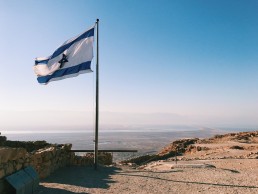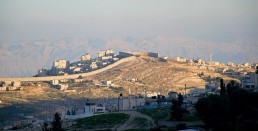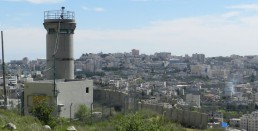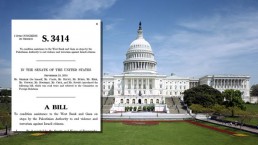JPOST: Zionism is about a secure, Jewish, democratic Israel
A two-state solution may or may not be achievable in the near future, but closing the door on it to accommodate extreme annexationists’ whims might close the door on the kind of Zionism we uphold.
In “Zionism is about being pioneers in the land” (Jerusalem Post, October 8, 2020), Prof. Hillel Frisch kindly credits me for what he described as having “heroically commanded the regiment that suffered the brunt of the Egyptian surprise attack,” and as leading “one of the first forces to cross the Suez Canal” in the Yom Kippur War. Astonishingly, he leaps from recounting this existential moment to describing the “strategic settlement plan” of the Palestinian Authority as “a challenge that Israel and Zionism never faced before.” Seriously?
Is a plan for civil construction in an area totally controlled by Israel, put forth by a weak, indeed hardly surviving Palestinian government, a greater challenge to today’s all-powerful Israel than the coordinated Egyptian-Syrian attack on that fateful Yom Kippur? Greater than the 1948 War of Independence, or the absorption in 1949-51 of some 650,000 Jewish refugees by a population of about equal size? Greater than the absorption of a million immigrants from the former Soviet Union in a single decade, or greater than the Iranian nuclear threat?
However, inflating a Palestinian plan to the magnitude of an existential threat is hardly the most bizarre feature of Prof. Frisch’s piece. Far more significant is his failure to appreciate the distinction between today’s reality and the pre-state struggle to secure a national home for the Jewish people where none existed. Then, land grabs were a primary mission. It was a clear prerequisite for securing a space for Jewish statehood. Today, the only existential challenge to Israel, the strong, thriving sovereign state of the Jewish people, is a program of further land grabs that ignores the three million Palestinian residents of the West Bank, whose absorption might spell the end of the Zionist enterprise.
Likewise, Prof. Frisch’s statement that pioneering settlements of the first half of the previous century, known as Homa Umigdal, are “as relevant [to Israel’s security – A.R.] today as they were in the 1930s” is odd at best. He must have missed a century of developments in national security and modern warfare. Without belaboring the point, it is not civilian presence that secures Israel from incoming missiles, infiltrating terrorists, or any security risk in between. It is the IDF’s troops and capabilities, certainly unmatched in the region, that keep Israel secure.
If anything, a score of Jewish families in remote settlements, deep in heavily populated Palestinian areas, present an added burden for national security. It imposes on the IDF the need to deploy in these areas and police the civilian population, at the expense of preparedness for its core mission of addressing threats to our security from the North (Hezbollah, Syria), South (Hamas) and East (Iran).
BORN AND RAISED here, and having fought for our country, I uphold our historic right to the land of our ancestors. However, ignoring the fact that between the Jordan River and the Mediterranean Sea there is roughly an equal number of Jews and Arabs (including our some two million Arab citizens), leaves open the question how we assure the future of Israel as a secure, democratic, Jewish state. On the one hand, in any future agreement, we must insist on incorporating into sovereign Israel major Jewish settlement blocs as well as Jewish neighborhoods in east Jerusalem, where the overwhelming majority of Jewish settlers reside. On the other hand, we must free ourselves of controlling, policing and managing the lives of millions of Palestinians. This can only happen through a negotiated two-state solution.
Prof. Frisch also presumes to educate my Commanders for Israel’s Security (CIS) colleagues and me about our upbringing. Just as I never checked – nor ever cared about – the political orientation of my commanders, my subordinates or my troops, I have no idea what the political affiliations are of any of my CIS colleagues. Speaking for myself, he is dead wrong in attributing my position to alleged allegiance to some old Labor Zionism. Indeed, I was born and raised in a conservative religious family, committed to the Zionist-Revisionist stream. As a child, I sang in synagogue choirs. My late parents supported Menachem Begin. And during the curfew imposed by the British Mandate, at the age of 10, I plastered Irgun posters on Tel Aviv buildings while evading capture by patrolling British troops.
Prof. Frisch is right in accusing my 300-plus CIS colleagues and me of supporting separation from the Palestinians, eventually into a two-state reality.
His Zionism, that sanctifies land – however populated by millions of Palestinians – over the Jewish and Democratic future of Israel, is not our Zionism. Ours rests on the more than 10,000 years of cumulative security experience of CIS members, and our battle-hardened realism. These have taught us that, militarily, we are stronger than all our challengers. But it has also taught us the limits of military power: There is no military answer to demography and to the aspirations of our Palestinian neighbors.
A two-state solution may or may not be achievable in the near future, but closing the door on it to accommodate extreme annexationists’ whims might close the door on the kind of Zionism we uphold, that which is enshrined in Israel’s Declaration of Independence.
Maj.-Gen. (ret.) Amnon Reshef is the former commander of the IDF Armored Corps. He is the founder, a former chair and a current member of Commanders for Israel’s Security (CIS).
Annexation: A Disaster in the Making
![]()
Amnon Reshef | HAARETZ | 4.9.20
Gideon Levy must have a real easy time of it, living in a world he divides with astonishing simplicity and unparalleled self-righteousness into good and bad; a world in which his country is overwhelmingly on the wrong side of the equation.
“To come out against annexation now gives hypocrisy, sanctimony and self-righteousness a bad name. Self-declared fascists would be preferable to fighters for justice like this,” writes Levy in a recent article (Haaretz, April 5). Lest you think otherwise, he was referring to the 220 members of Commanders for Israel’s Security (CIS) who signed an ad calling upon Benny Gantz and Gabi Ashkenazi to block moves towards unilateral annexation. If nothing else, Levy’s piece - itself a remarkable exercise in self-righteousness - demonstrated an extraordinary lack of self-awareness.
The overarching goal of CIS, the organization I set up five years ago, and its 300 members, all retired IDF generals and Mossad, Shin Bet and police equivalents, is to “bolster Israel’s security as a democratic state with a solid and sustainable Jewish majority, in the spirit of the Declaration of Independence.”
Our movement’s vision holds that two states for two peoples in a regional context is the only solution that secures this goal. For reasons we need not elaborate here, this goal is not currently within reach. President Trump’s “deal of the century” is a good illustration of the difficulties involved. The plan failed to secure a Palestinian or regional partner, and even Israeli supporters of a peace initiative found it lacking. The absence of an immediate plan of action, however, is no reason to close the door on future progress towards a two-state solution by taking steps towards unilateral annexation that could ignite a conflagration and undermine the security of Israel’s citizens.
Unilateral annexation, even limited in scope, will bring this scenario to fruition. It will signify to the Palestinians that Israel has decided to put an end to the age of agreements, rule permanently in the West Bank, and unilaterally determine the boundaries of its control in the territories, thereby terminating their hopes for independence. Palestinians who have until now chosen to cooperate with Israel and ease tension on the ground - above all the leadership of the PA and its security forces - will immediately lose whatever remains of their public legitimacy. In the wake of annexation, cooperation between Palestinian and Israeli security forces will be denounced as collaboration with the occupation and a betrayal of the Palestinian cause. From there it is but a small step towards the collapse of the PA and widespread anarchy, something the Hamas and other extremists are well positioned to exploit.
Along with hundreds of my colleagues, I fear that a unilateral annexation would thus oblige the IDF to deploy its forces in the streets of Nablus and Qalqilya and the alleyways of the casbah, bringing back the “good old days” of the Civil Administration during which Israel managed and financed the needs of the Palestinian population of the territories. Israel, in consequence, will be forced to reassert its control over the Palestinian cities it left back in 1995 following the Oslo accords.
Levy alleges that the rationale we put forth in our ad “deals only with the damage Israel is expected to incur, the financial price it will be forced to pay for annexation.”
To this charge I readily confess. We are concerned, above all, with Israel’s national interests: security, economic, and moral.
Israel’s security interest is not to deploy its soldiers inside Palestinian cities, nor to mortgage its standing army to police duties at the expense of war readiness. We have not forgotten the findings of the commission of inquiry about the heavy toll the IDF payed during the 2006 Lebanon war for previously deploying its troops in police missions in the territories during the Second Intifada.
Israel’s economic interest is not to bear the cost of financing the lives of millions of Palestinians, an expense estimated at some NIS 52 billion per year. This encumbrance will fall on an Israeli economy already burdened by the fallout of the Corona crisis. Finally, we are very much concerned with the impact of annexing millions of Palestinians on the Jewish and democratic character of the State of Israel.
A common denominator unites the messianic-annexationist right with the extreme left: willing to forgo vital Israeli security interests. Both would lead us down the road to the same national catastrophe: a single state for two peoples, and the end of the Zionist dream.
This may be Gideon Levy’s vision. We at CIS have another goal in mind: a secure, democratic state with a solid Jewish majority for generations to come.
Maj. Gen. (Ret.) Amnon Reshef, a former commander of the IDF armored corps, is founder and former chairperson of CIS. Presently he chairs the CIS steering committee.
An Alternative Gaza Strategy
[su_spacer size="10"]Major Gen. (ret.) Amnon Reshef | 11.3.2019 | HA'ARETZ
Any time there is an interval between one flare-up of tensions and another in the Gaza Strip, there is an Israeli tendency to turn to ‘more pressing’ matters. The discourse boils down to surrendering to the "there is no solution" slogan and its mistaken underlying assumption that the choice begins with the dictates of Hamas and ends with the illusion of ending the problem with a military knockout - which threatens to drag the IDF into taking control over the Gaza Strip and managing the lives of its two million residents without an exit strategy.
The next government should consider alternative strategies, including the one offered by the Commanders for Israel's Security - to adopt a gradual, three-legged initiative: codify and upgrade the ceasefire; enable Gaza rehabilitation and development; facilitate reinstating the Palestinian Authority (PA) to administer the Strip.
The inter-dependency among the three facets underpinning the initiative stems from the following reality: Without Gaza rehabilitation there will be no stable ceasefire. Without stabilizing the ceasefire, donor countries refuse to invest in rehabilitation, lest their investment goes up in flames in another round of violence. The donor countries also refuse to strengthen Hamas, hence will only provide the resources needed once the PA is reinstated.
Three challenges stand in the way of executing the proposed initiative. The first is the Israeli government's refusal to allow the PA to return to the Gaza Strip. The refusal is derived from the government’s strategy of separating Gaza from the West Bank, in order to deprive the PA of the claim that it represents all Palestinians and is therefore a available partner for negotiations. I hope that our next government will prioritize calm for the Israeli residents of the Gaza surrounding (and the needs of the Gaza Palestinian population) over another excuse to avoid negotiations.
Once Israel changes course and chooses to engage, the US support can be expected. Likewise, cooperation with Egypt, which advocates a similar course, will secure the support of its partners - Jordan, Saudi Arabia and the United Arab Emirates. This broad coalition has the power to apply potent ‘carrots’ and ‘sticks’, which should overcome the second obstacle: the PA’s reluctance to reassume responsibility for the Strip.
While important PA leaders in Ramallah support this process, President Mahmoud Abbas and some others oppose it. Some suggest that Abbas is too tired for the challenge, but younger contenders for leadership wish to pursue this course of action. Others have different interpretations for the intra-PA disagreements on this matter. Regardless of the reason, the Israeli initiative should address two legitimate PA concerns: one - that the return of the PA to Gaza before the Strip has been demilitarized would turn it into a victim of Israeli reprisals should any third party violate the ceasefire. This can be addressed via a security safety net, which will be incorporated into the new ceasefire understandings, and specify the conditions under which Israel will not retaliate but let the PA deal with violators as well as circumstances when it acts in self defense. The second is that the PA does not have the resources needed to administer and rehabilitate the Strip. To address this legitimate need, an economic safety net should be provided, based on a US-mobilized, donor community funds.
Besides the ‘carrots’ - which must involve changes in Washington’s attitude towards the PA - the regional coalition and, more importantly, Israel, have available powerful sticks. The mere threat of employing them might do the job.
The third challenge is Hamas: why should it agree to relinquish power? It turns out that the man at the helm in the Gaza Strip, Yahya Sinwar, has long concluded that if Hamas does not withdraw from civilian administration, it is likely to face the fate of other victims of the Arab Spring. Consequently, he developed a strategy for Hamas renewal, which involves withdrawal from the day-to-day administration of the Strip, a return to Hamas’ early mode of investing in its grass roots infrastructure,all in preparation for a future run for Palestinian leadership, and not only in the Gaza Strip.
In this context, he coordinated with Egypt, sent messages to Israel, and took concrete steps indicating his intention to replace Hamas management with the PA’s, and his confidence in his ability to force his colleagues to comply with the change. In so doing, he also took steps indicating that gradually, the change will not be confined to civilian matters. Some of the steps have already included consent to the deployment of 3,000 Ramallah Presidential Guard troops at the Gaza Strip’s borders and crossings as well as the PA's takeover of tax collection – Hamas’ main source of income; all provided that Hamas’s disarmament would only be dealt with in subsequent stages, when a unified Palestinian administration has been reinstated. After failing to obtain Israeli consent and initial Israeli gestures that demonstrate to his leadership colleagues and the broader constituency that his strategy was working and conditions in Gaza began to improve, he found refuge in extreme statements and escalation moves along the border and beyond.
There is no telling whether Sinwar will live up to his commitments and whether he will be able to overcome pockets of resistance within Hamas. In any case, signs of erosion in Hamas’s ability to enforce ceasefire discipline over its domestic challengers - primarily the Palestinian Islamic Jihad - should weigh heavily on our leaders’ minds. Which brings us back to the Israeli policy. Early Israeli response to the short term needs of the Gaza residents can enable Sinwar to demonstrate that his strategy is delivering results and may help enforce the ceasefire commitments on other organizations in the Strip.
Given the phased nature of the proposed initiative, the transition from implementing one stage of Israeli and international relief measures to another is contingent on the Palestinian sides’ compliance with the ceasefire conditions and the return of the Israeli MIAs and detainees.
It is the CIS conclusion that the upside of the proposed initiative exceeds its risks. If successful, it will bring lasting calm. It may also be a step in the long journey towards separation from the Palestinians in an eventual two-state solution. But even if the initiative fails, the security challenge we will face will not be significantly different than the current one. Yet, the sincere effort to bring about change by other than military force may result in greater understanding in the region and beyond if Israel is forced to pull the trigger once again. More importantly, Israelis will know that their government does not put our soldiers at harms way before exhausting all non-military alternatives.
Major Gen. (ret.) Amnon Reshef is Founder and Chairman of Commanders for Israel's Security and a former commander of the Israeli armored corps.
Annexation legislation is imminent, and dangerous
Mag. Gen. Amnon Reshef | Times Of Israel | 12.10.2018
While Israel has never been stronger, militarily and otherwise, the scope of its security challenges – north (Hezbollah; Iran in Syria), south (Hamas) and farther east (Iran) — is ominous. Nonetheless, though none can be taken lightly, they constitute no existential threat.
Ironically, the only serious challenge to the Zionist vision of a secure, democratic Israel with a solid Jewish majority for generations to come, and the possibility that during the term of the next Knesset this vision will face its greatest challenge since statehood, is forgivingly dismissed. This, despite the fact that, hidden in plain view, the national (and Knesset) minority that advocates West Bank annexation has used its disproportionate potency in the current government to all but complete the legislative, administrative and other prerequisites for annexation. Moreover, they have already tabled several competing partial West Bank annexation bills and make no secret of their resolve to enact them once re-elected.
Against that backdrop, Commanders for Israel’s Security (CIS), comprising 286 IDF generals and Mossad, Shin Bet and police equivalents, conducted a thorough analysis of two annexationists’ claims: that a ‘luxurious’ annexation, which incorporates as much territory with as little population, is possible, and that its fallout can be contained.
The CIS researchers concluded that the quantum leap from the long pursued ‘creeping’ annexation to annexation by legislation, whatever its scope, will trigger a chain reaction that will inevitably force Israel to re-capture the entire West Bank and take responsibility for the lives of its close to three million Palestinians. Thereafter, Israel will be a different place.
A Knesset annexation legislation will be viewed regionally and worldwide as an Israeli decision to slam the door shut on a future two-state solution. With that, security coordination with the Palestinian Authority (PA), that has won much praise from the IDF and Shin Bet, will lose whatever legitimacy is left since it was born as a means for promoting Palestinian independence. In the absence of a dynamic peace process, security coordination has long been unpopular with the Palestinian public. The proposed legislation will render it treasonous: serving only the Israeli occupation. A senior Palestinian officer put it this way: “with that, I’ll stop worrying if they show up for work in the morning and start worrying whether they show up with their weapons elsewhere…”.
In the absence of Palestinian security coordination, the security vacuum will be filled by armed Palestinian criminals and terrorists. Either to prevent that eventuality or in response to it, Israel will have to move in. Once the IDF takes over the Palestinian towns and villages, with substantial casualties on both sides, the PA (and donor countries’ funding) will disappear, and Israel will assume full responsibility for the lives and wellbeing of the millions of Palestinians therein.
The notion that Israel can annex Area C (the 60% of the West Bank under our control) is spurious for other reasons as well. Not the least due to the fact the Palestinian population centers (known as Areas A & B), constitute 169 ‘islands’, all surrounded by area C. Once C is annexed, the border between Israel and the Palestinian enclaves will be 1,800 km (1,100 mile) long, the equivalent of the distance from Jerusalem to Tehran. Not only will the cost of constructing such a long new security barrier (27 billion NIS) and the added budget for securing the hundreds of checkpoints and gates for Palestinian traffic from one village to the next (over 4 billion NIS annually) be prohibitive, but the entire standing army will be required for its control, leaving no forces to prepare for potential confrontations north, south and distant east.
Losing vital regional security assets, such as the strategic depth provided by coordination with Jordan and Egypt, or the even less visible yet equally important cooperation with Gulf States, will be another consequence of this reckless legislative initiative.
In sounding the alarm, the CIS generals lay out not only the security but all other consequences as well. They are careful to not presume to determine national policy, for obviously that is the exclusive domain of our government. However they are determined to make every effort to ascertain that no such decision is taken without a thorough, inter-ministerial analysis, coordinated by the Prime Minister’s National Security Staff (which has been presented with the CIS findings) and all its conclusions are presented in full transparency to the public for a decision in either elections or a referendum. For it is our national security, the very nature of our democracy and our Jewish majority that are at stake.
Gen. Reshef, a former Commander of the IDF Armored Corps, is Founder and Chairman of Commanders for Israel’s Security (CIS).
Deliberately Misleading
Maj. Gen. (Res.) Amnon Reshef responds
Originally published in Maariv, print and online editions | Friday, 7/7/2017
Caroline Glick [an Israeli Journalist, author of "The Israeli Solution: A One-State Plan for Peace in the Middle East"] points an accusing finger (“The PLO’s IDF Lobbyists,” The Jerusalem Post, June 26, 2017) at “IDF Generals” (as well as their retired predecessors), and their “common sense defying” decisions. She claims they “use their positions to advance policies that are contrary to the expressed position of the government,” “deliberately hide the details of their supporters,” and “lobby for Palestinian terrorists.” Defense Minister Avigdor Lieberman, who condemned these statements in no uncertain terms, rightly brought the full prestige of his office to bear in defense of those officers in uniform who, being on active duty, cannot answer the charges themselves.
In another article (“The Politics of Battle,” Maariv 30 June 2017) Glick gets confused between three different pieces of legislation, and then, having confused herself, proceeds to make outrageous assertions about Commanders for Israel’s Security.
Let us begin with the facts. The issue at hand is how to penalize the Palestinian Authority for supporting terrorists and their families. In this context Glick accuses “a senior officer or a delegation of retired officers” of preventing legislation in the US aimed at punishing Abu Mazen and the PA for supporting terror. Glick seems to forget that such legislation was already passed several years ago. She goes on to confuse three different laws: the first, a US law from 2015 penalizing the PA by deducting any sum the PA grants a terrorist or his family from the US aid it receives; the second, an Israeli bill submitted by MK Eleazar Stern to bring Israeli law into line with existing US legislation, so that Israel would deduct any sum the PA grants a terrorist or his family from taxes Israel collects on behalf of the PA.
The third piece of legislation, known as the Taylor Force bill (named after an American citizen killed in a terrorist attack in Israel) is a new one. It differs from the aforementioned legislation in the following two respects: a) it would require the US administration not only to deduct the sum distributed to a terrorist or his family from US aid, but to deny the Palestinian Authority US aid altogether; b) this blanket punishment would kick in from the moment the PA provides funds to the family of even a single terrorist.
Glick would do well to inquire with MK Stern why his bill parallels the existing US law and refrains from including language similar to the Taylor Force bill calling for a blanket freeze on the transfer of tax receipts to the PA. After all, if it is legal to deduct part of those tax receipts (i.e., if the government legal advisor approves), then it would be equally legal to freeze all tax income. In fact, she could have posed the same question to any number of current and former prime ministers and ministers of defense who, though they expressed their anger at the PA by freezing the transfer of tax income, released these funds shortly thereafter.
Contrary to what Glick thinks, then, Israeli government and the defense establishment over the years have been keenly aware that without tax income, the PA would collapse, and security coordination with the IDF would collapse along with it.
Along with supporters of the Stern bill, the 270 members of Commanders for Israel's Security are unanimous in demanding that the PA put an end to incitement, immediately cease payments to families of terrorists, persevere in the fight against terror and increase cooperation with the IDF. Contrary to Glick, however, we object to measures that would undermine the ability of the PA to do so. For this reason, while warning against the dangers to Israeli security posed by the Taylor Force bill as currently formulated, we have proposed changes to the bill that would serve to punish the PA for supporting terrorists and their families without throwing the baby out with the bathwater.
One possible change would be to limit these sanctions to funds that directly serve the Palestinian Authority. Most USA aid does not go through the PA budget in any event, but rather serves to pay its creditors, such as the Israel Electric Corporation or hospitals in East Jerusalem. Withholding funds that support the PA budget directly would indeed punish the PA if it continues to glorify terrorists and support their families. To avoid generating instability on the West Bank, however, the proposed change would exempt funds that directly help the civilian population.
The latter funds can be divided into two categories: some of the money goes to NGO’s that fight corruption and encourage government transparency or that promote the rights of women and children. The lion’s share, however, is invested by the US government directly in West Bank infrastructure projects that enhance the quality of life, strengthen the electrical grid and, above all, promote employment. All these activities (in addition to detailed security measures) are among those proposed in the Security First plan, as proposed by Commanders for Israel's Security. Adoption and implementation of this plan by the Israeli government, irrespective of whether or not a Palestinian partner exists, would enhance Israeli security and contribute to stability in the territories while a diplomatic solution remains out of reach.
Currently serving security and defense officials share our views and have repeatedly warned the US administration not to permanently undermine US assistance to the PA. Thus, just a few days ago, former US ambassador Dan Shapiro and Ilan Goldenberg, the former chief of staff to the special envoy for Israeli-Palestinian negotiations at the US State Department, wrote in an article published in Foreign Affairs (29 June 2017) that “active duty Israeli officers charged with maintaining security and stability in the West Bank have also repeatedly affirmed to us that they would not welcome any sustained reduction in assistance to the Palestinian Authority.”
In her article, Glick questions the commitment to Israel’s security of both serving generals and hundreds of members of our own movement, all of them formerly senior officers in the Mossad, the Israel Security Agency, the Israel Police and the IDF, who have collectively spent some 9,000 years defending the State of Israel. Glick claims, for instance, that our organization “refuses to reveal its sources of funding.” This is a lie, pure and simple. All she had to do, if she had bothered to try, was to inquire with the Registrar of Amutot in order to receive the same, precise information that is available to the general public.
Normally we would not bother correcting the factual errors in Glick’s article. She is not, after all, particularly well versed in the security and legislative issues she pontificates about. We must, however, protest her insinuation that there is something perfidious about our sources of funding, and that this is what lies behind the positions we take. We must repudiate her suggestion that hundreds of senior officers in the Mossad, the Israel Security Agency, the Police and the IDF would betray their true beliefs so as to satisfy donors. We must reject her accusation that they, as well as officers on active duty, are a “lobby for the PLO” and “Palestinian terrorists.”
Maj. Gen. (Res.) Amnon Reshef, former commander of the Armored Corps, is Chairman of Commanders for Israel's Security






